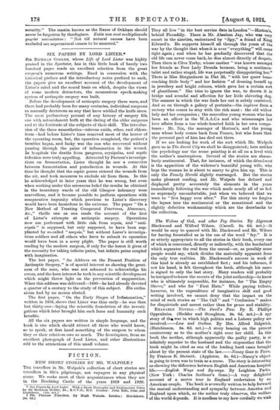SIX PAPERS BY LORD LISTER,*
Sot RICKMAN GODLEE, whose Life of Lord Lister was highly praised in the Spectator, has in this little book of barely two hundred pages made an excellent selection from the great surgeon's numerous writings. Read in connexion with the historical preface and the introductory notes prefixed to each, the papers give an excellent account of the development of Lister's mind and the sound basis on which, despite the views of some modern detractors, the momentous epoch-making system of antiseptic surgery was built.
Before the development of antiseptic surgery there were, and there had probably been for many centuries, individual surgeons as manually dexterous as any that have wielded the knife since. The meat perfunctory perusal of any history of surgery fills one with astonishment both at the daring of the older surgeons and at the fortitude of the subjects. of their skill. The introduc- tion of the three anaesthetics—nitrous oxide, ether, and chloro- form—had before Lister's time removed most of the horror of the operating room, but, the operation completed, the patient's troubles began, and lucky was the one who recovered without passing through the pains of inflammation in the wound. In hospitals the deaths from gangrene, erysipelas, and septic infection wore truly appalling. Attracted by Pasteur's investiga- tions on fermentation, Lister thought he saw a connexion between fermentation and putrefaction in wounds. At this time he thought that the septic germs entered the wounds from the air, and took measures to exclude air from them. In this he acknowledged in later years that he was wrong, but even when working under this erroneous belief the results he obtained in the insanitary wards of the old Glasgow infirmary were marvellous, and it became possible to perform operations with comparative impunity which previous to Lister's discovery would have been hazardous in the extreme. The paper " On a New Method of Treating Compound Fractures, Abscesses, &c.," thrills one as one reads the account of the first of Lister's attempts at antiseptic surgery. Operations now are performed with little risk from sepsis, and " anti- sepsis " is supposed, but only supposed, to have been sup- planted by so-called " asepsis," but without Lister's investiga- tions soldiers and all others who have to submit to operation would have been in a sorry plight. The paper is still worth reading by the modern surgeon, if only for the lesson it gives of the necessity for taking infinite pains, but infinite pains coupled with imagination.
The last paper, " An Address on the Present Position of Antiseptic Surgery," is of special interest as showing the great- ness of the man, who was not ashamed to acknowledge his errors, and the keen interest he took in any scientific development which might throw light on the prevention of suppuration. When this. address was delivered-1890—he had already devoted a quarter of a century to the study of this subject. His enthu- siasm had by no means abated.
The first paper, " On the Early Stages of Inflafnmation,"
written in 1858, shows that Lister was thus early—he was then but thirty-one—laying the scientific foundation of the investi- gations which later brought him such fame and humanity such benefits.
All the six papers are written in simple language, and the book is one which should attract all those who would know, so to speak, at first hand something of the surgeon to whom they or their relatives owe so much. The frontispiece, from an excellent photograph of Lord Lister, and other illustrations add to the attractions of this small volume.


































 Previous page
Previous page